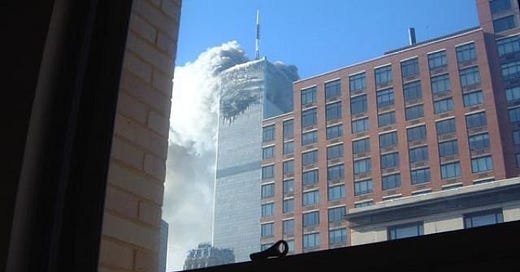
Being in Boston on 9/11 is very strange. It’s not the way Harvard commemorates 9/11 or the way I’ve seen people here talk about the day that makes it so. It’s the sheer fact of being reminded of something that I've never really thought about before: that what is for me a yearly commemoration of an attack on my home is for my fellow Americans a yearly commemoration of an attack on their country.
I don’t know what schools elsewhere in the U.S. do on 9/11. I do know that people the country over remember where they were when news of the attack struck, in the same way that people of my grandparents’ generation remember where they were when Lee Harvey Oswald shot John F. Kennedy. But when nearly every year I was given a homework assignment on September 10th to ask my parents about their 9/11 experiences, it was different from that. My parents’ stories weren’t just upsetting; they were harrowing. So, with some exceptions, were those of my classmates’ parents, and those exceptions were always the cause of a silent sigh of relief through the classroom.
I don’t mean to underplay the connection that non-New Yorkers1 have to that day, especially since two of the planes that Al-Qaeda hijacked were bound for Washington, D.C., and one of them made it. I mean simply to establish and acknowledge the distinction between the ties of home and country. The latter are intense and profound. There are surely Wisconsinites, Hoosiers, and Puerto Ricans who have stronger emotional responses to thinking about 9/11 than I do, and they are not somehow unworthy of those feelings.2 But teachers at my high school watched the towers fall through the windows of chemistry classrooms. My school shut down in-building operations so it could serve as a command center for the city’s emergency response. For nearly a month, Stuyvesant’s students and teachers attended school in half-day segments at Brooklyn Technical High School in Fort Greene.
I have never been to the 9/11 Museum. I may go at some point out of interest in historical memory. I feel no desire or urge to go now because I was reminded of 9/11 nearly every single day for three years.3 Every time I saw the Freedom Tower, I remembered that I was walking on the streets where the 9/11 attacks were brought into this world. Every time I left the school building, I remembered that my immediate world, the landscape I physically inhabited during most of my waking hours, was what Osama Bin Laden had sought to level.
It wasn’t just going to school in the neighborhood that made me feel this way. My born-after-9/11 self would have felt it merely by the virtue of living in New York. It is my hometown. It is my home. For almost as long as I have known about 9/11, I have known that it was not just an attack on New York. Still, it is surreal to feel it as such. 9/11 has always been to me a day of local commemoration; I still cannot experience it as a national one.
For a thorough examination of this category, see E. B. White’s lovely Here is New York.
Nor do I think that non-New Yorker’s reactions are necessarily more inclined to fall into Islamophobia or bloodthirst.
I was in high school for four years, but from about March 2020 to March 2021 I attended class from my home over Zoom because of the coronavirus pandemic.



